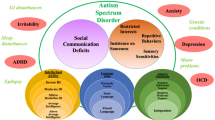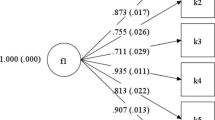Summary
Diagnostic checklists for the assessment of DSM-III-R Axis I diagnoses have proven to be a reliable and feasable instrument in research and routine clinical care. Therefore, a checklist for the assessment of the DSM-III-R Personality Disorders (MDCL-P) has been developed. An English version of the MDCL-P is available. The MDCL-P has been tested for reliability in a test-retest design. The average duration of the interview was 36 min. Of the patients, 48% received a diagnosis of at least one personality disorder. The Kappa value concerning the distinction personality disorder as opposed to no personality disorder was 0.62. The range of Kappa values of specific personality disorders, which were diagnosed at least five times, was from 0.35 to 0.79.
Similar content being viewed by others
References
Bishop YMM, Feinberg SE, Holland PW (1975) Discrete multivariate analysis: theory and practice. MIT Press, Cambridge, Mass
Bronisch T (1992) Diagnostik von Persönlichkeitsstörungen nach den Kriterien aktueller internationaler Klassifikations-systeme. Verhaltenstherapie 2:140–150
Bronisch T, Hiller W, Zaudig M, Mombour W (in press) MDCL-P Münchner Diagnose-Checklisten für die DSM-III-R/ICD-10 Persönlichkeitsstörungen (MDCL-P). Hans Huber, Bern
Bronisch T, Klerman GL (1991) Personality functioning: change and stability in relationship to symptoms and psychopathology. J Pers Dis 5:307–317
Carey C, Gottesman II (1979) Reliability and validity in binary ratings. Areas of common misunderstanding in diagnosis and symptom ratings. Arch Gen Psychiatry 35:1454–1459
Cohen J (1960) A coefficient of agreement for nominal scales. Educ Psychol Meas 20:37–46
Fleiss JL (1981) Statistical methods for rates and proportions, 2nd edn. Wiley, New York
Grove WM, Andreasen NC, McDonald-Scott P, Keller MB, Shapiro RW (1981) Reliability studies of psychiatric diagnosis. Theory and practice. Arch Gen Psychiatry 38:408–413
Hiller W, Bose M von, Dichtl G, Agerer D (1990) Reliability of checklist-guided diagnoses for DSM-III-R affective and anxiety disorders. J Affect Dis 20:235–247
Hiller W, Zaudig M, Mombour W (1990) Development of diagnostic checklists for use in routine clinical care. A guideline designed to assess DSM-III-R diagnoses. Arch Gen Psychiatry 47:782–784
Hyler SE, Rieder RO, Spitzer RL (1978) Personality Diagnostic Questionnaire (PDQ). New York State Psychiatric Institute, New York
Hyler SE, Rieder RO, Williams JB, Spitzer RL, Hendler J, Lyons M (1988) The personality diagnostic questionnaire: development and preliminary results. J Pers Dis 2:229–237
Hyler SE, Skodol AE, Kellmann HD, Oldham JM, Rosnick L (1990) Validity of the personality diagnostic questionnaire—revised: comparison with two structured interviews. Am J Psychiatry 147:1043–1048
Hyler SE, Skodol AE, Oldham JM, Kellman DH, Doidge N (1992) Validity of the Personality Diagnostic Questionnaire—Revised: A replication in an outpatient sample. Compr Psychiatry 33:73–77
Loranger AW (1988) Personality Disorder Examination (PDE) Manual. DV Communications, Yonkers, NY
Loranger AW, Lehmann Susman V, Oldham JM, Russakoff LM (1987) The personality disorder examination: a preliminary report. J Pers Dis 1:1–13
Millon T (1983) Millon Clinical Multiaxial Inventory—Manual (3rd ed). National Computer Systems, Minneapolis
Millon T (1987) Millon Clinical Multiaxial Inventory—II (manual). National Computer Systems, Minneapolis
O'Boyle M, Self D (1990) A comparison of two interviews for DSM-III-R personality disorder. Psychiatry Res 32:85–92
Pfohl B, Blum N, Zimmerman M, Stangl D (1989) Structured Interview for DSM-III-R Personality SIDP-R. Department of Psychiatry, University of Iowa, Iowa City, Iowa
Pfohl B, Stangl D, Zimmermann M (1982) The Structured Interview for DSM-III Personality Disorders (SIDP). Department of Psychiatry, University of Iowa, Iowa City, Iowa
Reich JH, Green AI (1991) Effect of personality disorders on outcome of treatment. J Nerv Ment Dis 179:74–82
Shrout PE, Spitzer RL, Fleiss JL (1987) Quantification of agreement in psychiatric diagnosis revisited. Arch Gen Psychiatry 44:172–177
Spitzer RL, Williams JBW (1986) Structured clinical interview for DSM-III personality disorders (SCID II, 2/1/86). Biometric Research Department, New York State Psychiatric Institute, New York
Spitzer RL, Williams JBW, Gibbon M, First M (1990) User's Guide for the Structured Clinical Interview for DSM-III-R. American Psychiatric Association Press, Washington, DC
Spitznagel EL, Helzer JE (1985) A proposed solution to the base rate problem in the kappa statistic. Arch Gen Psychiatry 42:725–728
Standage K, Ladha N (1988) An examination of the reliability of the personality disorder examination and a comparison with other methods of identifying personality disorders in a clinical sample. J Pers Dis 2:267–271
Stangl D, Pfohl B, Zimmermann M, Bowers W, Corenthal C (1985) A structured interview for the DSM-III personality disorders. A preliminary report. Arch Gen Psychiatry 42:591–596
Zerssen D von (1986) Clinical self-rating scales (CSR-S) of the Munich Psychiatric Information System (Psychis München). In: Sartorius N, Ban TA (eds) Assessment of Depression. Springer, Berlin Heidelberg New York, 270–303
Author information
Authors and Affiliations
Rights and permissions
About this article
Cite this article
Bronisch, T., Garcia-Borreguero, D., Flett, S. et al. The munich diagnostic checklist for the assessment of DSM-III-R Personality Disorders for use in routine clinical care and research. Eur Arch Psychiatry Clin Nuerosci 242, 77–81 (1992). https://doi.org/10.1007/BF02191550
Issue Date:
DOI: https://doi.org/10.1007/BF02191550




